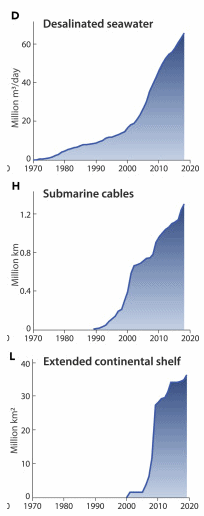Wit’s End: The Waste Land – ‘Human behavior is as immutable as the leopard’s spots’
By Gail Zawacki
25 September 2016 (Wit’s End) – My last post here at Wit’s End received some thoughtful queries which deserved an answer in kind, a response I have assiduously procrastinated making – an avoidance which was made easier by a ten day trip with minimal access to the internet. Most of the photos in this post are from my journey to the UK earlier this month. What follows is my belated reply (with apologies), especially to Michael Jensen’s question, “How has your personal mission changed, as the likelihood of your minimal long-term impact on the trajectory of global collapse has become clear?” Most often, writing on a blog feels to have no more effect than idly dropping a pebble in the ocean, and watching the tiny ripples disappear; lately it seems that climate heating has gone exponential, and in my imagination I anticipate the moment I will hear an official NASA announcement on the radio – that it’s too late to mitigate climate change because irreversible amplifying feedbacks have taken over and there’s nothing left but to listen to the orchestra play on the deck. For years, once I realized humans have despoiled the glorious biodiversity it took millions of years of evolution to achieve, I grieved. I was angry and horrified and mostly wracked with guilt about being oblivious of my own contribution to the Endocene, including having children. I wanted to know how and why our species is so destructive, and I needed to understand why most people persist in believing humanity is ecologically sustainable when we so patently are not. So I read a lot about history, archaeology, psychology, evolution, and biology. I came to understand that human behavior is as immutable as the leopards’ spots, and that humans are fundamentally an invasive species.“Humans are just like any other invasive species,” Stanford University biology professor Elizabeth Hadly said. “If we use up our resources, we will decline. It is stating the obvious, but our study shows that even over vast geographic areas such as continents, humans can consume too much, too fast.”
Our species first appeared in Africa about 200,000 years ago, then spread to Europe and Asia and eventually crossed into the Americas roughly 15,000 to 20,000 years ago using a land bridge that once connected Siberia and Alaska.
The first phase of colonization in South America coincided with the extinction of many large animals including elephant relatives, saber-toothed cats, big ground sloths, armadillos, and huge flightless birds. [more]


I agree with this piece, and wrote my own piece on the same topic. See WHY STEADY ARE IMPOSSIBLE http://www.jayhanson.us/why.htm
Jay
thanks so much for posting this.
We could have built something different, better, more equitable, but didn't. It did not have to be this way. As hard-wired as we are, we still have choices. The ones we've made were not sustainable or just. Rampant population growth was simply stupid. We had the choice but chose not to (overcoming stupidstitions is still a huge problem in the modern era).
I can't bring myself to write about this anymore, at least not right now, becuase it just too hard to overcome the growing levels of ignorance and denial. I was recently called an 'eco-terrorist' for pointing out the obvious signs of our pollution. Common sense has been abdicated for religious idiocy. So let them go extinct, as they should. They deserve none of this world and I'm not going to lift a finger to help.